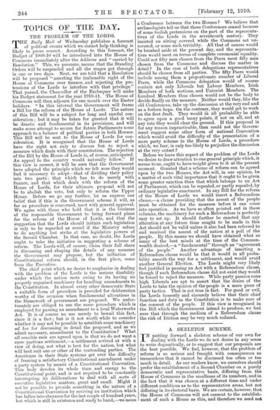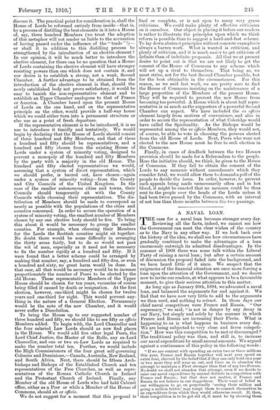A SKELETON SCHEME.
TN putting forward a skeleton scheme of our own for dealing with the Lords we do not desire in any sense to write dogmatically, or to suggest that our proposals are the best possible. We feel, however, that the problem of reform is so serious and fraught with consequences so tremendous that it cannot be discussed too often or too much in detail. As our readers know, we ourselves should prefer the establishment of a Second Chamber on a purely democratic and representative basis, differing from the House of Commons in the smallness of its numbers, and in the fact that it was chosen at a different time and under different conditions as to the representative areas, but not differing in its electoral basis. We are certain, however, that the House of Commons will not consent to the establish- ment of such a House as this, and therefore we need not discuss it. The practical point for consideration is, shall the House of Lords be reformed entirely from inside—that is, by a process of distilling the best elements in it into a House of, say, three hundred Members (we trust the adoption of this metaphor will not render us liable to the accusation of having passed under the influence of the " trade " !)- or shall it in addition to this distilling process be strengthened by the introduction of an elective element ? In our opinion, it will be much better to introduce the elective element, for there can be no question that a House of Lords containing the elective element will have stronger resisting powers than one which does not contain it, and our desire is to establish a strong, not a weak, Second Chamber. A further advantage to be obtained from the introduction of the elective element is that, should the newly established. body not prove satisfactory, it would be easy to banish the non-representative element and to establish an Upper Chamber analogous to that of France or America. A Chamber based upon the present House of Lords on the one hand, and on the representative principle on the other, would provide a half-way house which we could either turn into a permanent structure or else use as a point of fresh departure. If the representative element is to be introduced, it is no use to introduce it timidly and tentatively. We would begin by declaring that the House of Lords should consist of three hundred and fifty Members, and that of these a hundred and fifty should be representatives, and a hundred and fifty chosen from the existing House of Lords under a system of minority voting, designed to prevent a monopoly of the hundred and fifty Members by the party with a majority in the old House. The hundred and fifty elected representatives we would, assuming that a system of direct representation, which we should prefer, is barred out, have chosen—again under a system of minority voting—from the County and City Councils of the United Kingdom. In the case of the smaller autonomous cities and towns, their Councils should temporarily sit with the County Councils while choosing their representatives. The dis- tribution of Members should be made to correspond as nearly as possible with the populations of the cities and counties concerned. In order to secure the operation of a system of minority voting, the smallest number of Members chosen by any one elective body should be five. To bring this about it would be necessary to group the smaller counties. For example, when choosing their Members for the Lords the Scottish counties might sit together. No doubt there would be some difficulty in arranging the thirty areas fairly, but to do so would not pass the wit of man, especially as it need not be necessary to fix the number rigidly at a hundred and fifty. If it were found that a better scheme could be arranged by making that number, say, a hundred. and fifty-five, or even a hundred and sixty, no great harm would be done. In that case, all that would be necessary would be to increase proportionately the number of Peers to be elected by the old House. These representative Members of the Upper House should be chosen for ten years, vacancies of course being filled if caused by death or resignation. At the first election, however, one-third might be chosen for twelve years and one-third for eight. This would prevent any- thing in the nature of a General Election. Permanency would be the note of the new Chamber, and it would never suffer a Dissolution.
To bring the House up to our suggested number of three hundred and fifty, we should like to see fifty ex officio Members added. To begin with, the Lord Chancellor and the four salaried Law Lords should. as now find places in the House. We would add five other legal Peers, the Lord Chief Justice, the Master of the Rolls, any ex-Lord Chancellor, and one or two ex-Law Lords as required to make the number total ten. Further, we would include the High Commissioners of the four great self-governing Colonies and Dominions,—Canada, Australia, New Zealand, and South Africa. Next, there should. be fifteen Arch- bishops and Bishops of the Established Church and ten representatives of the Free Churches, as well as repre- sentatives of the Roman Catholic Church in Ireland and the Protestant Church of Ireland. Finally, any Member of the old House of Lords who had held Cabinet office, either as a Peer or while a Member of the House of Commons, should sit ex officio.
We do not suggest for a moment that this proposal is final or complete, or is not open to many very grave criticisms. We could make plenty of effective criticisms on it ourselves. Our object in placing it before our readers is rather to illustrate the principles upon which we think reform is possible than to suggest a hard-and-fast scheme. To lay down abstract principles without concrete examples is always a barren work. What is wanted is criticism, and plenty of criticism, and it is much easier to get criticism of definite than of indefinite proposals. All that we at present desire to point out is that we are not likely to get the consent of the House of Commons to any scheme which will set up a rival to themselves. That being so, we must strive, not for the best Second Chamber possible, but for the best obtainable in the circumstances. For this reason, as we said last week, we are pretty sure to find the House of Commons insisting on the maintenance of a large proportion of the Members of the present House. They will be required. to prevent the new House from becoming too powerful. A House which is about half repre- sentative is as much as the supporters of a powerful Second. Chamber can expect. We have included the ex officio element largely from motives of convenience, and also in order to secure the representation of what Coleridge would. have called. the Spirituality. As the Bishops would be represented among the ex officio Members, they would not, of course, be able to vote in choosing the persons elected. from the old. House of Lords. Next, Peers who were not elected to the new House must be free to seek election in the Commons.
Finally, in cases of deadlock between the two Houses provision should be made for a Referendum to the people. Here the initiative should, we think, be given to the House of Commons. If they fail to obtain the consent of the Lords to any measure without amendments which they consider fatal, we would. allow them to demand. a poll of the people to decide the issue. In order, however, to prevent such appeals being made unnecessarily often and in hot blood, it might be enacted that no measure could be thus sent to the people over the heads of the Lords unless it had been twice passed. by the Commons, with an interval of not less than three months between the two passings.











































 Previous page
Previous page